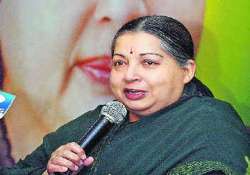Judicial hurdles to be weeded out: Jayalalithaa
Chennai: Tamil Nadu Chief Minister J. Jayalalithaa Tuesday said the Alternate Disputes Resolution (ADR) was an integral part of modern legal practice and would weed out hurdles in universal justice.Inaugurating the ADR Centre here, Jayalalithaa

Chennai: Tamil Nadu Chief Minister J. Jayalalithaa Tuesday said the Alternate Disputes Resolution (ADR) was an integral part of modern legal practice and would weed out hurdles in universal justice.
Inaugurating the ADR Centre here, Jayalalithaa said: "ADR is now an integral part of modern legal practice and jurisprudence. This will go a long way in weeding out impediments to securing universal justice."
According to her, growing population, increasing awareness of rights and the confidence of the people in the judiciary have witnessed a tremendous spurt in litigation.
"In the Indian context, lack of awareness of legal provisions, mystifying legal terms, delays in disposal and the prohibitive cost of litigation were some of the barriers to accessing justice," Jayalalithaa said.
"The cost of litigation has increased exponentially over time and the ability of the marginalised sections to avail their constitutional right to legal remedies is seriously hampered by their lack of resources. There are a lot of litigants clamouring for speedy justice," she added.
She said through careful thought and precise planning, the ADR mechanism had been put in place with legal validity as the vital elements of judiciousness, fairness, equality and compassion cannot be allowed to be sacrificed for the sake of expeditious disposal.
"The main methods of ADR are negotiation, mediation, conciliation and arbitration," she said.
According to her, the ADR mechanism is a pragmatic tool in solving new generation familial conflicts given the surge of matrimonial disputes in the courts.
"Litigation - whether for divorce, maintenance, alimony, child custody or any other matrimonial cause - should cease to be viewed in terms of failure or success of legal action. The amicable settlement of family conflicts is a social therapy," she said.
According to Jayalalithaa in any conflict it is the woman who encounters an uphill struggle to realise her rights to equality and dignity.
Inaugurating the ADR Centre here, Jayalalithaa said: "ADR is now an integral part of modern legal practice and jurisprudence. This will go a long way in weeding out impediments to securing universal justice."
According to her, growing population, increasing awareness of rights and the confidence of the people in the judiciary have witnessed a tremendous spurt in litigation.
"In the Indian context, lack of awareness of legal provisions, mystifying legal terms, delays in disposal and the prohibitive cost of litigation were some of the barriers to accessing justice," Jayalalithaa said.
"The cost of litigation has increased exponentially over time and the ability of the marginalised sections to avail their constitutional right to legal remedies is seriously hampered by their lack of resources. There are a lot of litigants clamouring for speedy justice," she added.
She said through careful thought and precise planning, the ADR mechanism had been put in place with legal validity as the vital elements of judiciousness, fairness, equality and compassion cannot be allowed to be sacrificed for the sake of expeditious disposal.
"The main methods of ADR are negotiation, mediation, conciliation and arbitration," she said.
According to her, the ADR mechanism is a pragmatic tool in solving new generation familial conflicts given the surge of matrimonial disputes in the courts.
"Litigation - whether for divorce, maintenance, alimony, child custody or any other matrimonial cause - should cease to be viewed in terms of failure or success of legal action. The amicable settlement of family conflicts is a social therapy," she said.
According to Jayalalithaa in any conflict it is the woman who encounters an uphill struggle to realise her rights to equality and dignity.